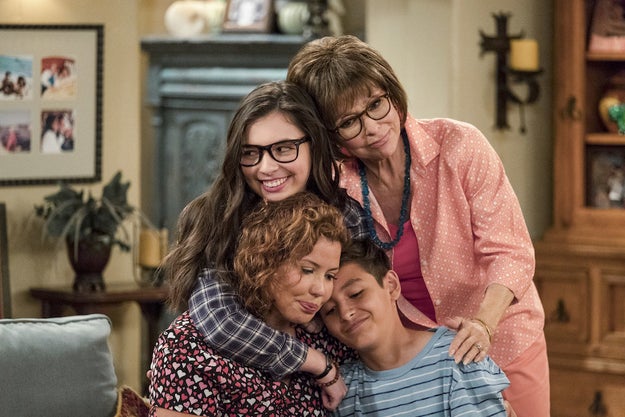
Isabella Gomez (Elena Alvarez), Rita Moreno (Lydia Riera), and Justina Machado (Penelope Alvarez), in the "Roots" episode of Season 2 of One Day at a Time.
Netflix
Donald Trump’s name is not explicitly mentioned in the second season of One Day at a Time, but his presence is felt everywhere.
Stars Isabella Gomez and her onscreen mom, Justina Machado, told BuzzFeed News they couldn't ignore how the Trump administration is working to reshape the country, especially for immigrants, but they were adamant about not wanting his name anywhere near their show.
"We’re a Latinx family living in 2018, so we had to mention it because it affects us, it affects our country, and it affects our world," said Gomez. But, she said, she was "so happy we never have to say his name."
“I love the episode about citizenship," added Machado, "when Elena says, ‘That monster is in the White House’ and Lydia says, ‘Don’t blame me, I didn’t vote for him.’
"But we never have to say his name because we don’t want to say his name," she said.
The Alvarez family is comprised of Penelope Alvarez (Machado), her teenage daughter Elena Alvarez (Gomez), younger son Alex Alvarez (Marcel Ruiz), and Penelope’s mother, Lydia Riera (Rita Moreno), who lives with them in the Echo Park neighborhood of Los Angeles.
This season, which debuted on Netflix on Jan. 26, navigates what life is like for a Cuban-American family in Trump's America, where many Latino immigrants are wondering if they're welcome or not.

AFP / Getty Images
In Episode 4, titled “Roots,” Lydia reveals to her family that she never became a US citizen because she didn't want to give up on a country that still felt like home. Elena, who saw her best friend's parents get deported to Mexico in the first season, pleads with her grandmother to take the necessary steps to become a citizen because, as she says, “these are very anti-immigrant times.”
Gomez said she had a difficult time filming the conversation between Elena and Lydia because of the subject matter.
“It was a hard scene for me to find the beats because Elena’s usually very angry and she just yells and marches and that’s what she does. But she was scared here,” Gomez said. “She can’t get deported because she was born here, but we get to see her fear of 'My grandma could be deported and I lost my best friend to deportation, even if it wasn’t directly.'”
Machado said she was glad that she gets to tell a story about a Cuban-American family because “we forget that this was only 40 years ago that they came here with absolutely nothing.”
But she stressed that “every Latino story is different” and that Latino families experience these issues differently depending on their backgrounds.
“We don’t have the same immigrant story. I’m Puerto Rican; we’re American citizens. Cubans are political exiles,” Machado said. “I don’t even know what it feels like to be scared to be deported.
"But I know what it feels like to be a Latina … and I love that this Cuban-American family is dealing with [Trump’s presidency] the way this Cuban-American family would deal with it," she said.

Adam Rose / Netflix
The actors said One Day at a Time is doing wonders for Latino representation on television in ways that not many other shows have been. Their sitcom does not include stereotypes like “sexy maids” or “gangbanger girlfriends,” the actors said, but instead depicts the Alvarez family as “layered human beings.”
“It’s changing the Latino narrative and it’s letting people know that we are more alike than we are different,” Machado said. “We’re telling a universal story through our Latino lens.”
via BuzzFeed/Travel
